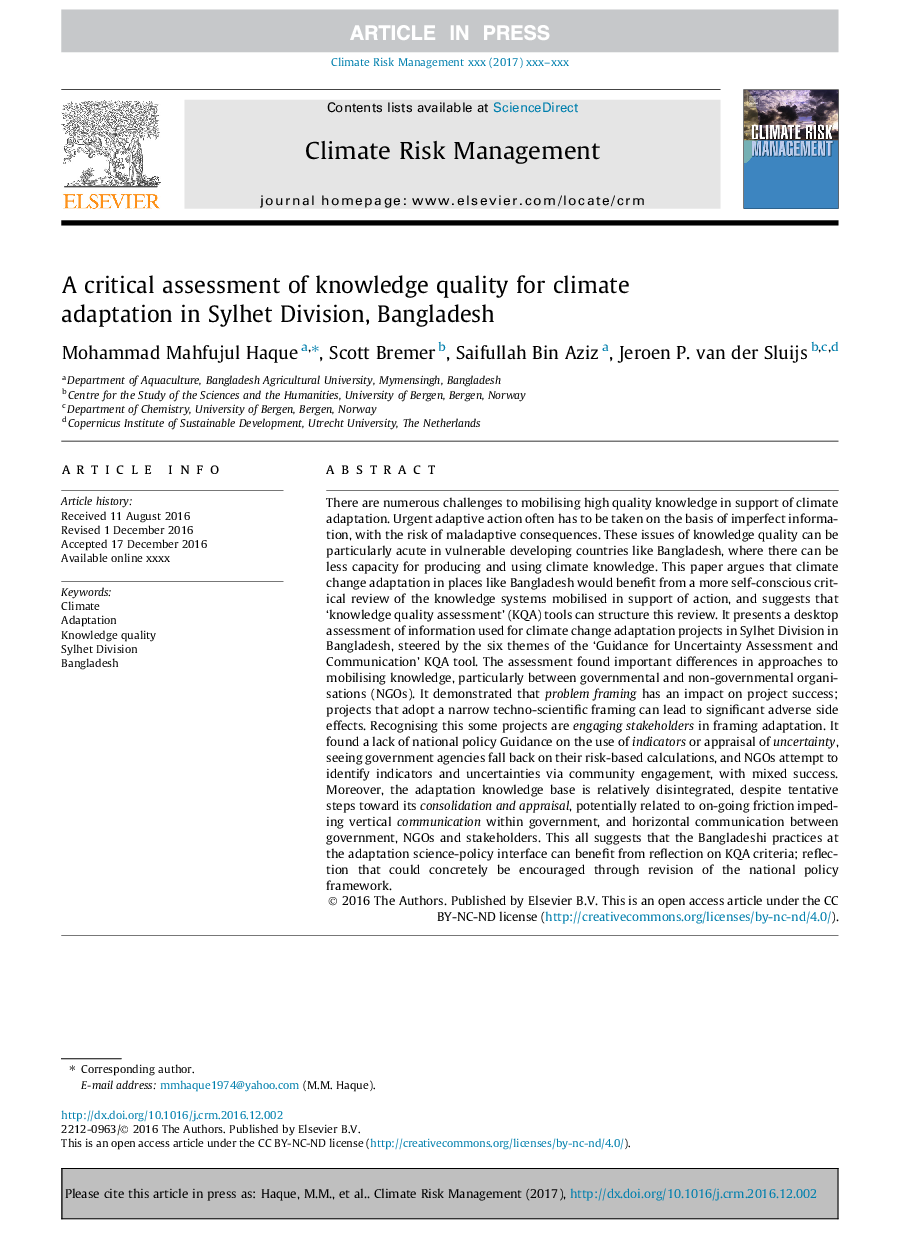| کد مقاله | کد نشریه | سال انتشار | مقاله انگلیسی | نسخه تمام متن |
|---|---|---|---|---|
| 5115317 | 1484876 | 2017 | 16 صفحه PDF | دانلود رایگان |
عنوان انگلیسی مقاله ISI
A critical assessment of knowledge quality for climate adaptation in Sylhet Division, Bangladesh
ترجمه فارسی عنوان
ارزیابی انتقادی از کیفیت دانش برای سازگاری آب و هوا در بخش سیلچت، بنگلادش
دانلود مقاله + سفارش ترجمه
دانلود مقاله ISI انگلیسی
رایگان برای ایرانیان
کلمات کلیدی
آب و هوا، انطباق، کیفیت دانش، بخش سیلچه، بنگلادش،
موضوعات مرتبط
مهندسی و علوم پایه
علوم زمین و سیارات
علم هواشناسی
چکیده انگلیسی
There are numerous challenges to mobilising high quality knowledge in support of climate adaptation. Urgent adaptive action often has to be taken on the basis of imperfect information, with the risk of maladaptive consequences. These issues of knowledge quality can be particularly acute in vulnerable developing countries like Bangladesh, where there can be less capacity for producing and using climate knowledge. This paper argues that climate change adaptation in places like Bangladesh would benefit from a more self-conscious critical review of the knowledge systems mobilised in support of action, and suggests that 'knowledge quality assessment' (KQA) tools can structure this review. It presents a desktop assessment of information used for climate change adaptation projects in Sylhet Division in Bangladesh, steered by the six themes of the 'Guidance for Uncertainty Assessment and Communication' KQA tool. The assessment found important differences in approaches to mobilising knowledge, particularly between governmental and non-governmental organisations (NGOs). It demonstrated that problem framing has an impact on project success; projects that adopt a narrow techno-scientific framing can lead to significant adverse side effects. Recognising this some projects are engaging stakeholders in framing adaptation. It found a lack of national policy Guidance on the use of indicators or appraisal of uncertainty, seeing government agencies fall back on their risk-based calculations, and NGOs attempt to identify indicators and uncertainties via community engagement, with mixed success. Moreover, the adaptation knowledge base is relatively disintegrated, despite tentative steps toward its consolidation and appraisal, potentially related to on-going friction impeding vertical communication within government, and horizontal communication between government, NGOs and stakeholders. This all suggests that the Bangladeshi practices at the adaptation science-policy interface can benefit from reflection on KQA criteria; reflection that could concretely be encouraged through revision of the national policy framework.
ناشر
Database: Elsevier - ScienceDirect (ساینس دایرکت)
Journal: Climate Risk Management - Volume 16, 2017, Pages 43-58
Journal: Climate Risk Management - Volume 16, 2017, Pages 43-58
نویسندگان
Mohammad Mahfujul Haque, Scott Bremer, Saifullah Bin Aziz, Jeroen P. van der Sluijs,
